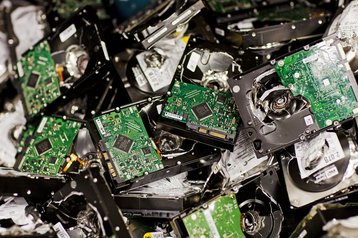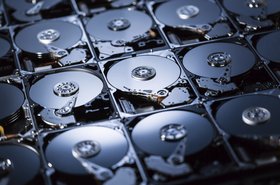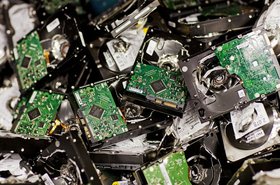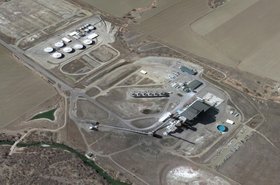Cryptocurrency mining surges have caused GPU shortages and price spikes, helped resurrect fossil fuel power plants, and consumed more energy than some countries.
Now, it's targeting the storage industry. (Update: For more on its impact on the storage market, we spoke to Seagate.)
Cryptocurrency Chiacoin has pitched itself as a green alternative to compute-intensive currencies like Bitcoin, Ethereum, and Dogecoin. Instead of requiring computational power, it primarily requires 'proof-of-space' in hard drives and SSDs to be mined.
Now, as Chiacoin's popularity spikes, hard drives are in high demand.
For breaking data center news, opinions, and features subscribe to DCD's newsletter
Driving drive demand
Chia uses 100GB clusters on a hard drive called plots. The more plots, the higher chance of winning some coin.
Calculations by Tom's Hardware estimate a 10TB drive should give a miner odds of winning at 0.000257 percent. But there are 4,608 Chia blocks created per day, with you given a chance to win each time.
The more blocks you have, the higher chance of winning Chiacoin, causing a bullrush on drives.
Earlier this month, Retail Asia noted that large capacity hard drives are virtually out of stock in Vietnam due to rocketing interest in Chia.
"Many of our customers bought the hard drives in bulk, from hundreds to thousands in one order, instead of a few units in one order as usual," Seagate Vietnam's Hoang Lam told the publication.
It is thought the hard drives were bought by Chinese operators, who had already acquired most of their homeland's large capacity hard drives. Shops that still stock 4TB and higher drives have increased prices dramatically.
“At peak times, prices have been at least 60 percent higher than usual. Prices dropped a bit recently but they are still about 50 percent [higher than normal] now,” one vendor told the South China Morning Post.
The official newspaper of the Chinese Communist Party's Beijing Municipal Committee, Beijing Daily, criticized the wastefulness of Bitcoin and Chiacoin.
"Recently, a virtual currency called Chiacoin has turned hard drives into a sought-after 'hard currency,' and there has been a trend of stock-out and price increases," the state publication said, complaining that desperate customers are buying surveillance-level hard disks that could instead be used for state surveillance.
"The shortage of mechanical hard drives also drives up the price of solid state drives, and ordinary SSDs generally rise by one or two hundred yuan."
While HDDs appear to be the primary target of Chia miners, SSDs are also being acquired en masse. This may prove a problem long term, as the mining process appears to test the limits of drives.
Mydrivers found that it took a 512GB SSD just 40 days to break, while a 1TB SSD lasted twice as long.
More than 3.9 million terabytes of storage space are currently being used by Chia miners. Given the fickle nature of cryptocurrency, it is impossible to predict how large the platform will grow and its long-term impact on hard drive markets. Previous Bitcoin booms have caused acute GPU shortages.
Chia was created by BitTorrent inventor Bram Cohen as a replacement for environmentally damaging cryptocurrencies. Bitcoin, for example, is thought to use more energy than the entire data center industry, according to the Bitcoin Energy Consumption Index.
It uses more power than Poland, and while some of the miners use renewable energy, others use coal and gas. Critics note that the renewable energy could also have been used on other tasks.
Chia, on the other hand, was pitched as a system that could take advantage of the exabytes of unused storage already in circulation. But instead, miners have turned to new drives to gain the currency.






